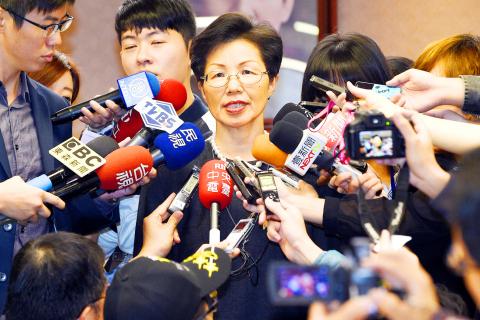Mainland Affairs Council (MAC) Minister Katharine Chang (張小月) yesterday said that the council is working on a new cross-strait policy to replace the so-called “1992 consensus” as part of its efforts to overcome the impasse across the Taiwan Strait.
Chang made the remarks during a meeting of the legislature’s Internal Administration Committee in Taipei, which was held to review the council’s budget proposal for the next fiscal year.
At the meeting, People First Party Legislator Chen Yi-chieh (陳怡潔) asked Chang to comment on remarks by Chinese Academy of Social Sciences Institute of Taiwan Studies head Zhou Zhihuai (周志懷) at an academic forum in China’s Guangxi Province on Nov. 30 that Beijing “does not oppose the idea of the 1992 consensus being substituted by a creative alternative.”

Photo: Chen Chih-chu, Taipei Times
“Do you interpret such comments as a gesture extending an olive branch? What is the council’s attitude about this?” Chen asked.
Chang said the council holds a positive view of Zhou’s remarks, but believes that only a mindset of “seeking common ground, while maintaining differences” would be conducive to cross-strait development.
“The council will positively and discreetly study [any proposals that can] promote cross-strait development. We are willing to sit down with Beijing at an opportune time to work out a solution,” Chang said.
She added that the council has been studying possible alternatives to the “1992 consensus.”
Cross-strait communication mechanisms have been suspended due to President Tsai Ing-wen’s (蔡英文) refusal to acknowledge the “1992 consensus,” which refers to a tacit understanding between the Chinese Nationalist Party (KMT) and the Chinese Communist Party that both sides of the Taiwan Strait acknowledge that there is “one China,” with each side having its own interpretation of what “China” means.
Former MAC chairman Su Chi (蘇起) said in 2006 that he had made up the term in 2000.
On the sidelines of the meeting, Chang said any forms of threat are not helpful to cross-strait ties, in response to reporters’ questions about Chinese air force missions circling Taiwan’s airspace on Nov. 25 and Dec. 10.
“[Beijing] has always adopted a stick-and-carrot approach to Taiwan. There is no type of threat that has a positive effect on cross-strait relations. Our stance is that we should maintain cross-strait peace and stability,” Chang said.

AGING: As of last month, people aged 65 or older accounted for 20.06 percent of the total population and the number of couples who got married fell by 18,685 from 2024 Taiwan has surpassed South Korea as the country least willing to have children, with an annual crude birthrate of 4.62 per 1,000 people, Ministry of the Interior data showed yesterday. The nation was previously ranked the second-lowest country in terms of total fertility rate, or the average number of children a woman has in her lifetime. However, South Korea’s fertility rate began to recover from 2023, with total fertility rate rising from 0.72 and estimated to reach 0.82 to 0.85 by last year, and the crude birthrate projected at 6.7 per 1,000 people. Japan’s crude birthrate was projected to fall below six,

Conflict with Taiwan could leave China with “massive economic disruption, catastrophic military losses, significant social unrest, and devastating sanctions,” a US think tank said in a report released on Monday. The German Marshall Fund released a report titled If China Attacks Taiwan: The Consequences for China of “Minor Conflict” and “Major War” Scenarios. The report details the “massive” economic, military, social and international costs to China in the event of a minor conflict or major war with Taiwan, estimating that the Chinese People’s Liberation Army (PLA) could sustain losses of more than half of its active-duty ground forces, including 100,000 troops. Understanding Chinese

US President Donald Trump in an interview with the New York Times published on Thursday said that “it’s up to” Chinese President Xi Jinping (習近平) what China does on Taiwan, but that he would be “very unhappy” with a change in the “status quo.” “He [Xi] considers it to be a part of China, and that’s up to him what he’s going to be doing, but I’ve expressed to him that I would be very unhappy if he did that, and I don’t think he’ll do that. I hope he doesn’t do that,” Trump said. Trump made the comments in the context

SELF-DEFENSE: Tokyo has accelerated its spending goal and its defense minister said the nation needs to discuss whether it should develop nuclear-powered submarines China is ramping up objections to what it sees as Japan’s desire to acquire nuclear weapons, despite Tokyo’s longstanding renunciation of such arms, deepening another fissure in the two neighbors’ increasingly tense ties. In what appears to be a concerted effort, China’s foreign and defense ministries issued statements on Thursday condemning alleged remilitarism efforts by Tokyo. The remarks came as two of the country’s top think tanks jointly issued a 29-page report framing actions by “right-wing forces” in Japan as posing a “serious threat” to world peace. While that report did not define “right-wing forces,” the Chinese Ministry of Foreign Affairs was